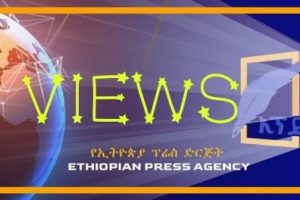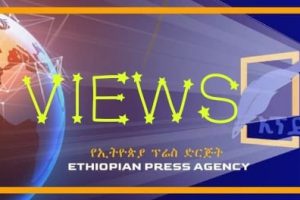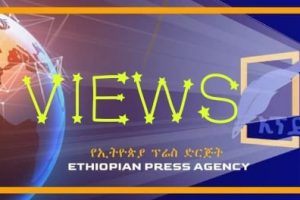BY ABEBE WOLDEGIORGIS
The Tigray People’s Liberation Front (TPLF) solely dominated the economic and political life of Ethiopia for nearly three decades. It assumed power as an outcome the 17-year armed struggle against the military Derg regime. In the early years of its rule, it promised to build a democratic system that protects and grantees individual and group rights as well as ensures freedom of expression.
It also pledged to liberalize the economy and give room for the private sector to play an enhanced role in the economy. At the start, it seemed that they were taking the right drastic measures in the right direction.
True, at the beginning, the country legally authorized opposition political parties to operate in the country and geared towards establishing a multiparty democracy and accommodating plural views. The country also for the first time allowed private media outlets.
To advance economic liberalization, it privatized public enterprises, though the previous land policy which allowed for state ownership of land remained intact.
The absence of land transaction value continued as it was and farmers have been given only the use rights of their plot. But sooner rather than later, the ray of hope was blocked and replaced by despair and frustration.
Freedom of expression enshrined in the constitution only served for media consumption and to earn the support of Western donors. Violations of any form of rights became a common phenomenon of Ethiopian political life.
Extrajudicial arrest and killing of opponents and independent thinkers became rampant. In the economic front, though some foreign and local private sector investments flourished, the plan to privatize inefficient public enterprises were not executed as per the plan and the promise. This remained one of the major factors for the prevalence of economic inefficiency.
It also became apparent that the system favored wealthy men who have a strong party and ethnic affiliation with the ruling class. The strong association between party politics and the economy were clearly manifested in the exploitative association of emerging business tycoons and the ruling party’s officials. Not only this, parties themselves indulged in illegal business and established empires.
Realizing peace and stability as well as sustainable economic development for a country which passes through successive political upheavals should have been the top priority of the ruling class; instead, it indulged in an unlawful wealth accumulation.
During the imperial and the Derg era, Ethiopia had experienced conflicts between the rulers and the ruled. In the TPLF era, the situation was changed; the nature of the conflict became ethnic. Many argue that the ethnic-based regional states, which sometimes go as far as claiming full autonomy, were the major factor behind the vagaries of horizontal conflicts here and there. The region states’ borders served as a tool for division between the indigenous and what the regional lords called settlers.
Some of regional states’ constitutions which are imposed from top to bottom clearly give exclusive rights to the so-called indigenous ethnic groups as owners of the land and the rest are only residing there by the will of the regional state administration.
The constitutions of Benishangul-Gumuz and Harari regional states are cases in point here. The law gives regional authorities a legal authority to decide on the fate of individuals based on their ethnic background.
As the result, for the last two decades hundreds of thousands of people were displaced from their homes, for most the only home they ever knew. Years ago, when people residing in Guraferda woreda in the Southern Nations Nationalities and Peoples State were evicted from their homes, the then regional government head told the media that they were evicted they found guilty of cutting forests. In the incident, people lost their life and property.
The ruling coalition, the Ethiopian People’s Revolutionary Democratic Front (EPRDF) which was totally dominated by TPLF claimed the ethnic federal system enabled it to ensure group rights. But the truth is the other way around.
In fact, it was the TPLF controlled government that was a kingmaker for the so-called regional states against the principle of the constitution’s principle of self-rule. Hence, the regional stated had no real power.
After the establishment of the Prosperity Party, the leaders of the regional governments of the Gambela, Benishangul-Gumuz and others openly confessed to the fact that their power was only nominal during TPLF’s reign.
Though it claimed to be a champion of the rights of the nations and nationalities, in reality it had no intention to be so other than using the system for its own power advantages. The regional territories rather truly served to create the country of minorities who face uncertainty.
The members of the minority groups were restricted to that limited area to live and create wealth and if they go to other places, they will be categorized as non-indigenous and will be denied of their basic rights.
Even though the then ruling party claimed that it established ethnic-based federalism to ensure self-rule, it was just a paper tiger in the absence of democracy.
Because true federalism in only attained by establishing a functioning democracy manifested by free and fair election. The five elections took place in the last three decades proved that the ruling elite did not have any intention to give up power peacefully.
To conduct free and fair election, there must be strong and independent institutions to discharge their tasks with other any intervention. But this was not the case.
There was no separation of power between the executive, legislative and the judiciary and all were manipulated by the ruling party. In such circumstances, it is impossible to conduct a free and fair election is impossible.
In the past, opposition parties tabled their complaints repeatedly to the Election Board with regard to the misconduct of the ruling party. Yet, the Electoral Board couldn’t do anything as it had no power.
International observers also proved it that elections fraud has been a common practice in Ethiopia. The 2005 elections can be mentioned as a case in point in this regard.
The federal system did not bring peace and democracy to the nation and nationalities because it opened the door for constant ethnic strife and conflict. This is a testimony to the fact that the federal system failed to accommodate diversity and maintain peaceful coexistence.
Attaining group rights by denying individual rights is a dreadful mistake because freedom of expression is part of democratic rights and naturally endowed to individual citizens.
These rights are not guaranteed by ensuring group rights alone. One might have different views from other members of his own ethnic group. The existence of various parties in the same ethnic group is a testimony to this fact.
The ultimate goal of political parties is to hold government power and execute policies which they believe would benefit the society. Currently, there are more than 100 parties and most of them are regional or ethnic-based. Even if they win elections in their localities, they will never be a majority party in the federal parliament to form a government unless they form coalitions with other parties.
Hence, establishing political parties along ethnic lines is not a sustainable option to bring about sustainable change. Besides, ethnic-based parties do not have a common aspiration for the country as a whole and are not comfortable when the issue of free and fair elections is raised. The ultimate fate of TPLF proved that extreme ethnic politics is self-destructive.
The Ethiopian Herald December 29/2020





